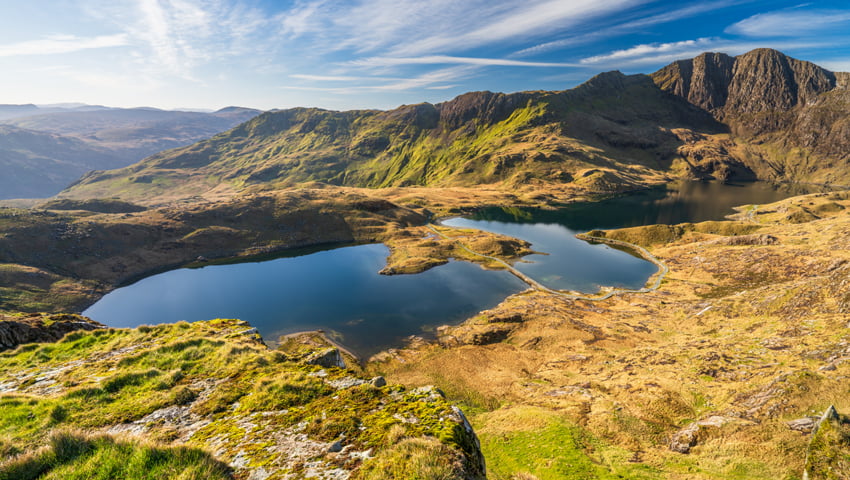Article by Dr David Clubb, Chair of Comisiwn Seilwaith Cenedlaethol Cymru/the National Infrastructure Commission for Wales
In the autumn of 2024, something quietly radical happened in Wales.
The National Infrastructure Commission for Wales (NICW) made a bold recommendation to Welsh Government: nature should have a voice in decisions about flood policy and infrastructure. Not just in the abstract, not as an afterthought, but as a real presence at the table and part of the decision-making process.
This wasn’t just a nod to environmental awareness. It was a challenge to reimagine governance itself.
What would it mean if nature – rivers, forests, coastlines – had a representative in our biggest decisions? Someone to speak not for profit or politics, but for the living systems that sustain us all?
This idea led to a deeper exploration. NICW began to ask: could we appoint a Nature Guardian; a role equivalent to one of our Commissioners who would act as a voice for the natural world in our deliberations? To explore the concept, NICW commissioned several pieces: a structural report by Simeon Rose, an essay and poem by Eurig Salisbury on the role of nature in Welsh myth, and a short video by Eurig Salisbury and Scott Waby on why nature deserves a seat on Boards.
Why should nature be on the board?
Nature is already part of Board deliberations – just invisibly. More as a subject than a participant. Every decision we make about infrastructure, planning, or land use shapes the ecosystems we depend on. Nature is the silent stakeholder: affected by choices, but never consulted.
That’s beginning to change. In 2022, a company called Faith In Nature became the first in the world to appoint nature as a board director, giving it both a voice and a vote. Since then, this approach has spread beyond the corporate world, into charities, research bodies, and communities. The concept suggests that it should result in better, longer-term decision-making and a growing culture of care and accountability.
What this model shows us is that when we bring nature into the conversation, it has the potential to help us make more informed decisions, not just for the environment, but for ourselves. It helps us pause, reflect, and think about consequences that stretch beyond election cycles or annual budgets.
What does a nature guardian actually do?
Think of a Nature Guardian as a kind of legal and ethical advocate; someone who represents nature’s interests the way a guardian might represent a child in court. They consult scientists, conservationists, and Indigenous knowledge holders. They speak up in meetings. They ask the difficult, often overlooked questions.
This can’t just be an add-on to existing roles. It needs to be a dedicated position; someone with expertise, independence, and deep commitment. At Faith In Nature, they rotate the role between environmental lawyers, ecologists, and campaigners. The goal isn’t just to protect, it’s to challenge and inspire.
Why Wales?
Because this land already knows how to listen.
Welsh culture is rich with stories that treat nature not as backdrop, but as living presence. In the Mabinogion, mountains, rivers, and animals aren’t just scenery – they’re active characters, shaping human fate. Our poets didn’t just admire the land – they praised it, feared it, learned from it. So incorporating Nature into our everyday lives isn’t new; we’re just elevating Nature back to a prominence given to it by our forbears.
As Eurig Salisbury writes, giving nature a voice is more than a policy choice. It’s a reconnection with language, with story, and with the living landscapes that hold our memory.
We saw this spirit alive again during a recent visit to Bannau Brycheiniog, where NICW Commissioners heard stories of nature-based decision-making in practice. The Future Generations Commissioner’s 2025 report even highlighted this model as a leading example of what’s possible when infrastructure meets imagination.
What could this change?
It could change everything; from how we design flood defences to how we plan roads, build homes, and define prosperity. A Nature Guardian on NICW’s board would mean every strategy, every major project, would begin with the question: Is this respectful? Is it regenerative? Will it help both people and ecosystems thrive?
As Karen Whitfield of Wales Environment Link said, “Infrastructure developments need to work in harmony with nature, so the idea of giving nature a voice on the board of such an important advisory body is inspiring. If the needs of nature can be fully articulated and advocated when planning the important infrastructure that Wales needs, it could mean a step change in the way that large projects are delivered, resulting in more community buy-in and greater resilience.”
A call to leadership
We often talk about “the voice of the people.” But what about the voice of place?
Giving nature a voice isn’t a gimmick. It’s a rebalancing. A necessary act of humility and imagination. And Wales, with its stories, its language, and its love of land, is uniquely placed to lead.
If we listen well, we don’t just protect nature. We protect ourselves, our communities, and the generations to come. It’s time. Let’s give nature the voice it has always deserved.
Dr David Clubb is the Chair of Comisiwn Seilwaith Cenedlaethol Cymru/the National Infrastructure Commission for Wales
